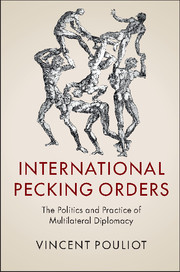Book contents
- Frontmatter
- Contents
- List of figures
- List of tables
- Preface and acknowledgments
- List of abbreviations
- Introduction: All the world's a stage
- Part I Situations
- Part II Dispositions
- Part III Relations
- Part IV Positions
- Conclusion: The “miracle” of multilateral pecking orders
- Appendix: Research design, methods and data
- References
- Index
Appendix: Research design, methods and data
Published online by Cambridge University Press: 05 March 2016
- Frontmatter
- Contents
- List of figures
- List of tables
- Preface and acknowledgments
- List of abbreviations
- Introduction: All the world's a stage
- Part I Situations
- Part II Dispositions
- Part III Relations
- Part IV Positions
- Conclusion: The “miracle” of multilateral pecking orders
- Appendix: Research design, methods and data
- References
- Index
Summary
This book is meant to take the reader on a journey to the engine room of world politics. As Neumann correctly points out, “very little seems to be known about the standard operational procedures and the everyday routines of diplomacy.” What exactly is going on inside multilateral chambers and antechambers? Methodologically speaking, the best way to redress this situation is to inductively recover the patterned ways of doing things that structure social sites of interest. A key assumption of practice theory is that world politics should be appraised in more or less the same way as any other social realm: by carefully tracing its basic constitutive practices.
While the book speaks to the analytically general phenomenon of social stratification, which cuts across not only world politics but also human society in general, empirically I focus on two specific social sites: NATO and the UN. These are two of the most prominent IOs to which permanent missions are attached. The logic of my case selection is straightforward: When it comes to pecking order dynamics, these two IOs present contrasting dynamics. While NATO is often construed as the archetype of a smoothly functioning multilateral organization, the UN is generally thought to be gripped by intense contestation over the distribution of standing among member states. These two IOs are also distinctive in terms of size and nature, the former being a relatively closed club of the powerful while the latter is a forum open to any and all. These differences make for an interesting comparison. I believe that some of the analytical findings drawn from these prominent cases can be extended to other multilateral organizations. Needless to say, in terms of policy relevance, understanding the internal politics of NATO and the UN is of great interest given that the former is the most powerful alliance ever created and the latter is the closest thing to a world parliament there is and ever was.
Practice theory is sometimes described as a “theory-method package,” meaning that its distinctive pragmatist ontology and epistemology produce a defined set of methodological implications. At the most basic level, practice theory contains a simple indictment: start with practices! Ways of doing things form the key empirical unit of analysis, which researchers inductively study.
- Type
- Chapter
- Information
- International Pecking OrdersThe Politics and Practice of Multilateral Diplomacy, pp. 272 - 307Publisher: Cambridge University PressPrint publication year: 2016



